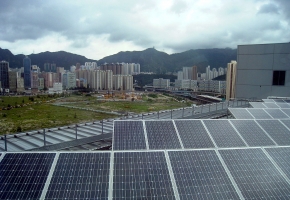Clouds Are No Problem for New Bacteria-Powered Solar Panels

Researchers at the University of British Columbia have developed a new kind of solar cells that can convert sunlight into electricity, but instead of using electronics like most solar cells, this particular invention relies on bacteria.
Many bacteria are already capable of turning sunlight into energy using photosynthesis. This is thanks to a chemical that the bacteria produce. The University of British Columbia researchers left the chemicals inside the bacteria, and used those bacteria themselves to generate electricity.
This new method allowed the researchers to gain a big advantage over other bacteria-based solar cells, nearly doubling the amount of electricity collected. That’s still not quite enough to compete with traditional solar panels, but this new bacteria-powered solar cell does have other advantages as well.
In particular, these new cells work just as well in low light as in bright, direct sunlight, meaning they can still generate plenty of electricity on cloudy days. In addition, these solar cells are made without the expensive materials and complicated manufacturing required for conventional solar panels, which mean these should be cleaner and cheaper to produce.







